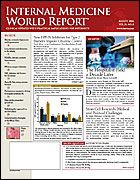Publication
Article
Internal Medicine World Report
Evaluate All Patients with CAD, Diabetes for Digestive Cancer
Author(s):
From Digestive Disease Week 2006
LOS ANGELES—Diabetes and coronary artery disease (CAD) appear to be warning signs for certain digestive cancers, said investigators at Digestive Disease Week. Data from 3 studies presented at the meeting demonstrate an association between diabetes, CAD, and pancreatic and colorectal cancers.
“The presence of diabetes or heart disease can be a signal for clinicians to evaluate patients’ risk for digestive cancers,” said Randall W. Burt, MD, professor of medicine, University of Utah. “The associations between these 2 diseases and cancer…provide a critical tool to diagnose cancer early when patients might benefit most from treatment.”
A recent diagnosis of diabetes may be a marker for early pancreatic cancer, said Mario Pelaez-Luna, MD. He and colleagues at the Mayo Clinic in Rochester, Minn, examined abdominal computed tomography (CT) scans of 20 patients who had both pancreatic cancer and diabetes. A total of 23 scans were obtained 6 months or longer before the patient was diagnosed with cancer; most were performed to investigate nonspecific abdominal pain or for reasons unrelated to the symptoms of pancreatic cancer.
At the time of cancer diagnosis, surgical resection was successful in only 21% of cases. All the CT scans obtained before the onset of diabetes were normal. At the first sign of elevated blood glucose levels, 85% of the patients still had a normal-appearing pancreas or evidence of early cancer. Cancer was diagnosed an average of 5 months after diabetes onset.
According to Dr Pelaez-Luna, these data suggest that the number of pancreatic cancers amenable to resection can be increased greatly if detected 6 months before clinical diagnosis. Because diabetes predated the diagnosis of pancreatic cancer by >12 months, the diagnosis of diabetes offers an opportunity for earlier cancer diagnosis and potentially better outcomes, he said.
In another study, investigators found that type 2 diabetes increased the risk for developing colorectal cancer, said Jill E. Elwing, MD, of Washington University, St. Louis.
Dr Elwing and colleagues studied 100 women with type 2 diabetes and 500 women without diabetes who were undergoing screening colonoscopy to assess the role of diabetes in the incidence of colorectal adenoma.
P
P
Of the women with diabetes, 37% had adenomas compared with 24% of those without diabetes ( = .009). Advanced adenomas were also significantly more prevalent in the diabetic women than in those without diabetes (14% vs 6%; = .009).
P
P
P
Obesity also was a factor for colorectal adenomas. Obese women had a higher rate of any colorectal adenoma compared with nonobese women (32% vs 22%; = .001), and obese women with diabetes were almost twice as likely to have an adenoma (42% vs 23%; ≤.001) and 3 times as likely to have advanced adenomas (19% vs 7%; ≤.001) compared with nonobese, nondiabetic women.
Another analysis, this one by investigators from the University of Hong Kong, showed that patients with CAD are also at high risk for the development of colorectal adenomas. They recruited 307 patients aged ≥50 years for screening colonoscopy after they underwent a coronary angiogram for suspected CAD.
P
P
P
The investigators found that the patients with CAD, who comprised 46.3% of the study cohort, had a significantly higher rate of colorectal neoplasia compared with patients without CAD (30.3% vs 19.4%; = .027). Advanced lesions were found in 16.9% of the CAD group and only 6.7% of the group without CAD ( = .005). There were 5 colorectal cancers detected in the CAD arm and none in the group without CAD ( = .015).
According to lead investigator Annie On On Chan, MD, CAD and colorectal cancer share risk factors, therefore “screening by colonoscopy of these patients should be mandatory to help prevent the disease and, if necessary, encourage early treatment.”
KEY POINTS
New evidence demonstrates that diabetes and CAD significantly increase the risk for the development of gastro-intestinal carcinoma.
All patients diagnosed with diabetes should be evaluated for pancreatic and colorectal cancer.
All patients with CAD should be screened by colonoscopy for colorectal cancer.
Early diagnosis of these cancers is associated with better outcomes.





